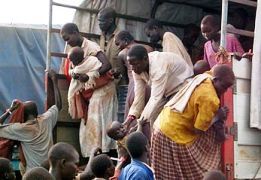Homecoming delayed for Sudanese refugees in Uganda
By Daniel Wallis
KAMPALA, Feb 5 (Reuters) – Shattered infrastructure and the threat of landmines are delaying the assisted return of thousands of south Sudanese refugees languishing in camps in northern Uganda, the U.N. refugee agency said on Saturday.

|
|
Sudanese refugees arriving at Kyangwali settlement in Uganda after being displaced from their original camp in Achol Pii. |
A peace deal for Sudan that ended Africa’s longest-running civil war last month has given hope to many of the 3 million people thought to have fled the 21-year conflict.
Uganda hosts about 220,000 of them, more than any other country bordering Sudan. The U.N. refugee agency (UNHCR) says moves to transport them home are not expected to start until October.
“We are taking a very cautious, phased approach,” Cindy Burns, the agency’s representative in Uganda, told Reuters.
“UNHCR has not been operating in southern Sudan for 20 years, so we are starting from scratch to begin receiving these groups. There is very little infrastructure in place, and of course there is the huge problem of landmines.”
She said officials from seven nations hosting Sudanese refugees — Central African Republic, Democratic Republic of Congo, Egypt, Eritrea, Ethiopia, Kenya and Uganda — held talks in Khartoum this week to discuss repatriation plans.
Sudan’s civil war broadly pitted the Islamist government based in the north against the mainly Christian, pagan south, complicated by issues of oil, ethnicity and ideology.
Analysts say some of those who fled to neighbouring states do not necessarily support southern leader John Garang — who becomes vice president under the peace deal — and are seeking assurances of their safety before making the journey home.
Uganda’s minister of state for disaster preparedness, Christine Amongin Aporu, said it was vital leaders from Garang’s Sudan People’s Liberation Movement visited the camps in northern Uganda to educate the residents about the accord with Khartoum.
“The major challenge we are facing now is talking to the refugees and giving them the confidence the peace agreement is going to embrace all Sudanese refugees,” she told Reuters.
The displaced communities in northern Uganda have also been plagued by the Lord’s Resistance Army (LRA), Ugandan rebels operating on both sides of the border who have waged a separate 18-year-old war against the government in Kampala.
More than 10,000 refugees crossed into Uganda last year to escape raids by the group inside southern Sudan, while about 20,000 were uprooted by attacks on their camps in Uganda.
Uganda’s government announced a limited ceasefire with the LRA this week, and Aporu said she hoped the push for talks by both sides in Uganda’s war would improve security and boost plans to help repatriate the Sudanese refugees.
Meanwhile, she echoed comments by Burns that since Sudan’s peace deal was signed in January there have been no large-scale movements of refugees heading home unaided.
“Among the unregistered refugees there may have been some spontaneous criss-crossing of the border,” Burns said.
“People are checking out the security situation, and probably checking out what has happened to their properties there, but there has been no movement out of our camps.”
